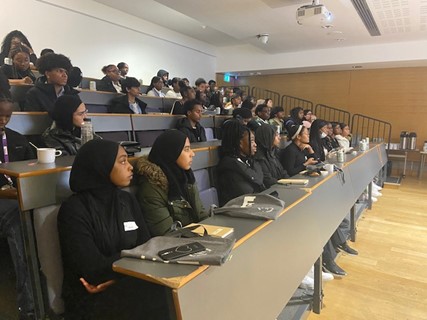The following essay was written by a Year 11 school student as part of University College London’s Aspiring Black Physiologists competition, supported by The Physiological Society. This is one of two winning essays, read the other essay here.

“Diversity is not about how we differ. Diversity is about embracing one another’s uniqueness.” Ola Joseph
This essay will be detailing the importance of diverse networks, research and teams in scientific research and discoveries. I will be addressing this prompt in three sections concluding with why I felt driven to write this essay and the future implications the prompt may have. The three sections for this essay are as follows; What is Diversity; Scientific Research- How Representation affects us all; and the Social and Political Impact of Scientific Diversity.
What is Diversity?
Diversity is “the practice or quality of including or involving people from a range of different social and ethnic backgrounds and of different genders, sexual orientations, etc.”. In its essence, representing all kinds of people equally and fully. Diversity is mandatory in many fields to ensure that accurate and representative decisions are being made when considering extensions of the human life e.g. sports, music or art. Through diversity, there has been major developments culturally and socially within the world. As a result of large shifts in proportions in race, age or sexual orientation, the UK in particular has been able to develop into a more rounded and colourful country. Significant cultural events such as the arrival of the Empire Windrush sparked change through racial tension and alleviation, such as the development of the Notting Hill Carnival as a way to celebrate the new era of the nation as well as to unite the people within it. This showcases how diversity can make significant changes socially, however, how does this affect the scientific community in particular?
Scientific Research- how does Representation affect us all?
Science works on the development of ideas amongst a community of open minds. Through this mindset, further advancements cannot be made in the scientific community if the researchers or research subject cater to one denominator; white men. For example, recent coronavirus outbreaks resulted in a large amount of deaths in the general population: research from CDC (Centres for Disease Control and Prevention) detailed that “of the 880,000 deaths” reported at the time, “750,000 where from ethnic minority groups”. Furthermore, a study carried out in 2021 by the Epidemiology Department of Cambridge University displayed the mortality rate of ethnic minorities as a result of chronic diseases as “far greater” than that of their white counterparts. Would there be as significant of a divide if equal research was applied to both groups? Diversity in scientific research is exactly how these values can be decreased: by allowing focus to be on the person affected over the illness that affects them.
Social and Political Impact of Scientific Diversity
Alongside the development of medicinal practices, diversity in scientific research stems further than just science. Scientific diversity allows marginalised groups to extend their horizons further than stereotypical expectancies, with confidence that they can get there. Studies surrounding the rate of acceptance of minorities and the rate of application show that “with a larger proportion of ethnic minorities in the field, similar increases were seen in applicants of the same racial backgrounds”. The direct correlation shows how allowing a more diverse team can encourage further diversity which, at its heart, is the most effective means to make further scientific advancements. Alternatively, considering political science holds a strong significance in the government of the world today, it is important that diversity afflicts these areas of science as well (since not all science is quantitative). The ability to share understandings and policies developed from minority struggles can provide development in areas that might not be reached by the arms of STEM jobs. More current conditions in the UK such as the cost of living crisis, which has resulted in a third of ethnically diverse not being able to pay their bills (“People Like Us” founder Sheeraz Gulsher states) require resolutions that can only be derived from varied outlooks to a situation. Considering the economics of the situation is all well and good, but decisions that ease the troubles for everyone can only be reached with diverse thinking.
In conclusion, I think scientific diversity in research is incredibly important for development in the field, as all changes can only be accomplished through collective understanding and work to a goal. I myself wish to work with the sciences at some point in my life, and seeing myself in the work already would be incredibly encouraging and supportive for my aspirations. Overall, scientific research is the key to improving the world as it is; diversity will catalyse the progress by unlocking more opportunities for people with different walks of life.

